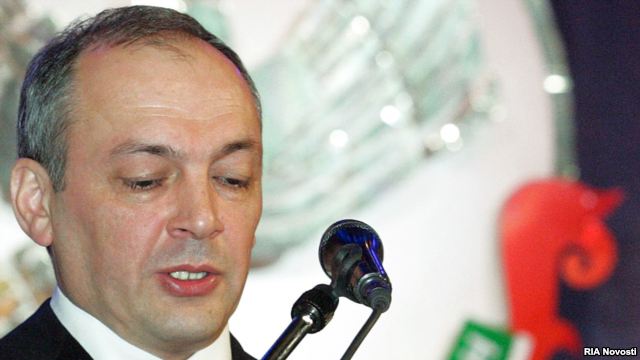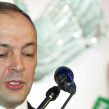
Dagestani Leader Tries to Remain Optimistic as Situation Points to Intractable Instability
Publication: Eurasia Daily Monitor Volume: 9 Issue: 50
By:

On March 9, a Russian military helicopter was hit by rebels in Dagestan’s Karabudakhkent district, in the vicinity of the village of Gubden. The helicopter’s crew managed to land the aircraft and reportedly avoided casualties. Still, the attack was just the latest indicator of the emboldened insurgency in the largest North Caucasian republic (https://www.riadagestan.ru/news/2012/3/9/133417/, March 9). Government forces retaliated with a massive artillery and aircraft assault on the forested area in the mountains from which the helicopter came under attack. The military later reported that they had blocked a group of up to 15 militants in the area (https://ria.ru/defense_safety/20120309/591097455.html, March 9). No subsequent information was provided, however, which likely means the insurgents escaped from the blockade unscathed.
According to a law-enforcement source, the group reportedly consisted of rebels from the remnants of the Karabudakhkent, Gubden and Izberbash insurgent units. A government source told the Interfax news agency that these units had earlier been “crushed by federal forces.” The source claimed that “[n]ow, in the winter, they have flocked together into one group. According to our information, they do not even have a single leader” (https://dagestan.kavkaz-uzel.ru/articles/202701/, March 9). The source did not explain why a demoralized militant group would want to shoot at a helicopter and thereby draw the attention of the military.
Earlier on March 6, a female suicide bomber attacked a police checkpoint in Karabudakhkent district, killing five officers and injuring two others. In February, the leader of the Dagestani insurgency, Ibragimhalil Daudov (aka Emir Salih), was killed in the district along with several other militants, including his son. Karabudakhkent district has an estimated population of 60,000, with a clear majority of ethnic Kumyks and a sizeable ethnic Dargin minority. Ethnic Kumyks are a Turkic-speaking people who also live in significant numbers in the other parts of the North Caucasus apart from Dagestan. Karabudakhkent district lies on the outskirts of the republican capital of Makhachkala in the republic’s south.
In Khasavyurt district, the other corner of Dagestan, a suspected rebel attacked a police checkpoint on March 9 and was killed (https://dagestan.kavkaz-uzel.ru/articles/202706/, March 9). Dagestan’s insurgency appears to have intensified attacks after the March 4 Russian presidential election. The rise of attacks may be coincidental, but the rationale behind the rebels’ actions may be that they do not now expect any change in Russian strategy in the region after Vladimir Putin again officially assumes presidential powers in Russia.
Meanwhile, residents of Dagestan are starting to distance themselves from commemorating Russian holidays. For example, March 8 has traditionally and officially been celebrated as International Women’s Day, first during the Soviet period and afterwards in the Russian Federation. In a sign of the growing cultural divergence between the most fervent Muslim parts of the North Caucasus and the rest of Russia, many North Caucasians, especially in Dagestan, Chechnya and Ingushetia, consciously refuse to celebrate this holiday. “We are all busy with our own stuff and we learn about this holiday only from the news and TV,” an anonymous resident of a Dagestani village told the Kavkazsky Uzel (Caucasian Knot) website. The respected Dagestani Muslim poet and civil activist, Adallo Aliev (aka Adallo), also spoke out against celebrating March 8 (https://dagestan.kavkaz-uzel.ru/articles/202680/, March 9). It came as a surprise to many observers when it was announced that most schools in the republic this year did not even celebrate the New Year holiday, which is extremely popular in the rest of Russia and coincides with a long Russian holiday period that is extended to cover Orthodox Christmas. Thus the observance of Russian holidays has become yet another point of friction between the increasingly Muslim North Caucasus and the rest of Russia.
On March 7, the day after the suicide attack in Karabudakhkent district, the head of Dagestan, Magomedsalam Magomedov, held a government meeting on the situation in the republic. Magomedov called on Dagestan’s residents to support the police and condemn the insurgents. The republican leader expressed optimism over the prospects of establishing law and order in Dagestan. “Fruitful work throughout the year allowed us to achieve good results,” he stated. “The stabilization trend in the region is disliked by some people. Desperate attempts are made not to allow us to establish peace and order in the republic. But the victory shall be ours anyway. I do not have any doubts about that” (https://www.riadagestan.ru/news/2012/3/7/133349/, March 7).
The source of Magomedov’s optimism is puzzling, since Dagestan experienced a surge in insurgent activities in 2011 and a corresponding rise in the number of victims, especially among the republic’s civilian population. At least 129 civilians died and 130 were injured in various attacks across the republic in 2011, according to open source analysis by Kavkazsky Uzel. In comparison, in 2010, the conflict in Dagestan claimed the lives of 78 civilians and injured 107 others. In addition, the number of people kidnapped in the republic increased from 18 in 2010 to 31 in 2011 (https://www.kavkaz-uzel.ru/articles/198813/, January 5).
Dagestani head Magomedov may be a proponent of a scorched earth policy in his own republic, but this attitude is unlikely to help bring peace to the region. Neither of Magomedov’s two predecessors, including his father Magomedali Magomedov, managed to pacify Dagestan. His chances of doing so are also not high, especially since he does not have the authority to start a political reconciliation process to resolve the conflict.
Even the hawkish Dagestani official Rizvan Kurbanov, who oversaw the activities of the police in the republic and now works in the Russian State Duma, criticized officials who refused to engage in talks with the more moderate militants. Kurbanov described his clash with Dagestan’s deputy interior minister, Vasily Salyutin, who reportedly refused responsibility for holding talks with repentant insurgents and in general expressed skepticism about the Dagestani commission for the adaptation of former rebels (https://dagestan.kavkaz-uzel.ru/articles/201744/, February 24).
With Vladimir Putin formally returning to power following the March 4 presidential elections, chances are high that even modest attempts to set up adaptation commissions for the militants will gradually fade away. An increase in the fierceness of the fighting might lead to a further expansion of the conflict in the North Caucasus and cause even higher levels of human rights abuses.




